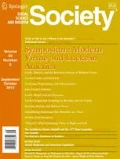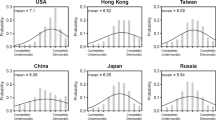Abstract
Liberal bias in academia is a complex sociological issue. The empirical evidence suggests that part of the explanation for ideological imbalance is that conservatives tend to self-select out of careers in higher education. We examine the explanation offered by Neil Gross that political-typing is partially responsible. While we are generally receptive to this explanation, our own research provides some evidence that college students do not find academia to be a hostile or unpleasant place. This raises some questions about why they would self-select out of careers in academia. We also offer alternative explanations for conservative criticism of the academy and suggest that institutions of higher education have some responsibility for creating the impression that they are hostile to conservative views.
Similar content being viewed by others
Notes
Indeed, there is an ongoing debate over whether students are even learning in the traditional sense (Arum and Roksa 2011, Kelly-Woessner and Woessner 2006), let alone whether they are internalizing complex ideological messages. Arum and Roska’s critique that college students show only modest gains in reading and writing over four years in college is not merely a devastating criticism of higher education, but potentially evidence that students are resistant to subtle political ques.
Further Reading
Arum, R., & Roksa, J. 2011. Academically adrift: Limited learning on college campuses. University of Chicago Press.
Cable, D. M., & Judge, T. A. 1996. Person–organization fit, job choice decisions, and organizational entry. Organizational Behavior and Human Decision Processes, 67(3), 294–311.
Cable, D. M., & Judge, T. A. 1997. Interviewers’ perceptions of person–organization fit and organizational selection decisions. Journal of Applied Psychology, 82(4), 546.
Chambliss, D. F., & Takacs, C. G. 2014. How college works. Cambridge, MA: Harvard University Press.
Dettrey, B. J., & Palmer, H. D. 2013. Reconsidering individual-level heterogeneity in economic voting. Electoral Studies, 32(4), 718–728.
Fish, S. 2008. Save the world on your own time. Oxford University Press.
Huckfeldt, R. 2001. The social communication of political expertise. American Journal of Political Science, 45, 425–438.
Judge, T. A., & Cable, D. M. 1997. Applicant personality, organizational culture, and organization attraction. Personnel Psychology, 50(2), 359–394.
Kelly-Woessner, A., & Woessner, M. C. 2006. My Professor is a partisan hack: How perceptions of a professor’s political views affect student course evaluations. PS: Political Science & Politics, 39(03), 495–501.
Kelly-Woessner, A., & Woessner, M. 2008. Conflict in the classroom: Considering the effects of partisan difference on political education. Journal of Political Science Education, 4(3), 265–285.
Kelly-Woessner, A., & Woessner, M. 2011. Promoting a “House of study”. Society, 48(3), 227–231.
Latzer, B. 2004. The Hollow Core: Failure of the General Education Curriculum. A Fifty College Study. American Council of Trustees and Alumni.
Legault, L., Gutsell, J. N., & Inzlicht, M. 2011. Ironic effects of antiprejudice messages How motivational interventions Can reduce (but also increase) prejudice. Psychological Science, 22(12), 1472–1477.
Lindholm, J. A. 2004. Pathways to the professoriate: The role of self, others, and environment in shaping academic career aspirations. The Journal of Higher Education, 75(6), 603–635.
Lodge, M., Taber, C., & Galonsky, A. C. 1999. The political consequences of motivated reasoning: Partisan bias in information processing. Atlanta, Georgia: Paper presented at the annual meeting of the American Political Science Association.
Lord, C. G., Ross, L., & Leeper, M. R. 1979. Biased assimilation and attitude polarization: The effects of prior theories on subsequently considered evidence. Journal of Personality and Social Psychology, 37, 2098–2109.
Maranto, R., & Woessner, M. 2012a. Diversifying the academy: How conservative academics can thrive in liberal academia. PS: Political Science and Politics, 45(3), 469–475.
Maranto, R., & Woessner, M. 2012b. Seeking relevance: American political science and america. Academic Questions, 25(3), 403–417.
Montanaro, D. 2013. NBC News/WSJ poll: Affirmative action support at historic low. Retrieved from http://firstread.nbcnews.com/_news/2013/06/11/18885926-nbc-newswsj-poll-affirmative-action-support-at-historic-low?lite on February 1, 2014.
Nelson, T. E., Sanbonmatsu, K., & McClerking, H. K. 2007. Playing a different race card: Examining the limits of elite influence on perceptions of racism. The Journal of Politics, 69(2), 416–429.
Nyhan, B., & Reifler, J. 2010. Corrections fail: The persistence of political misperceptions. Political Behavior, 32(2), 303–330.
Rothman, S., Kelly-Woessner, A., & Woessner, M. 2011. The still divided academy: How competing visions of power, politics, and diversity complicate the mission of higher education. Rowman & Littlefield.
Sanders, K., Willemsen, T. M., & Millar, C. C. 2009. Views from above the glass ceiling: does the academic environment influence women professors’ careers and experiences? Sex Roles, 60(5–6), 301–312.
Schmidt, Peter. 2014. Backlash Against Israel Boycott Throws Academic Association on Defensive. New York Times, January 5, 2014. Retrieved from http://www.nytimes.com/2014/01/06/us/backlash-against-israel-boycott-throws-academic-association-on-defensive.html?_r=0 on February 1, 2014.
Sidanius, J., Levin, S., Van Laar, C., & Sears, D. O. 2008. The diversity challenge. New York: Russell Sage.
Van Anders, S. M. 2004. Why the academic pipeline leaks: Fewer men than women perceive barriers to becoming professors. Sex Roles, 51(9–10), 511–521.
Woessner, Matthew. 2005. “Scandal, Elites and Presidential Popularity: Considering the Importance of Cues in Public Support of the President” Presidential Studies Quarterly, 35:1, March 2005
Woessner, M., & Kelly-Woessner, A. 2009. Left pipeline: Why conservatives don’t get doctorates. In R. Maranto, R. E. Redding, & F. M. Hess (Eds.), The politically correct university: Problems, scope, and reforms (pp. 38–59). Washington, DC: American Enterprise Institute.
Woessner, Matthew and April Kelly-Woessner. 2006. “Reparations and Race Relations in America: An Experimental test of Group Conflict Theory.” Politics and Policy. Volume 34, Number 1
Author information
Authors and Affiliations
Corresponding author
Rights and permissions
About this article
Cite this article
Woessner, M., Kelly-Woessner, A. Reflections on Academic Liberalism and Conservative Criticism. Soc 52, 35–41 (2015). https://doi.org/10.1007/s12115-014-9864-0
Published:
Issue Date:
DOI: https://doi.org/10.1007/s12115-014-9864-0




